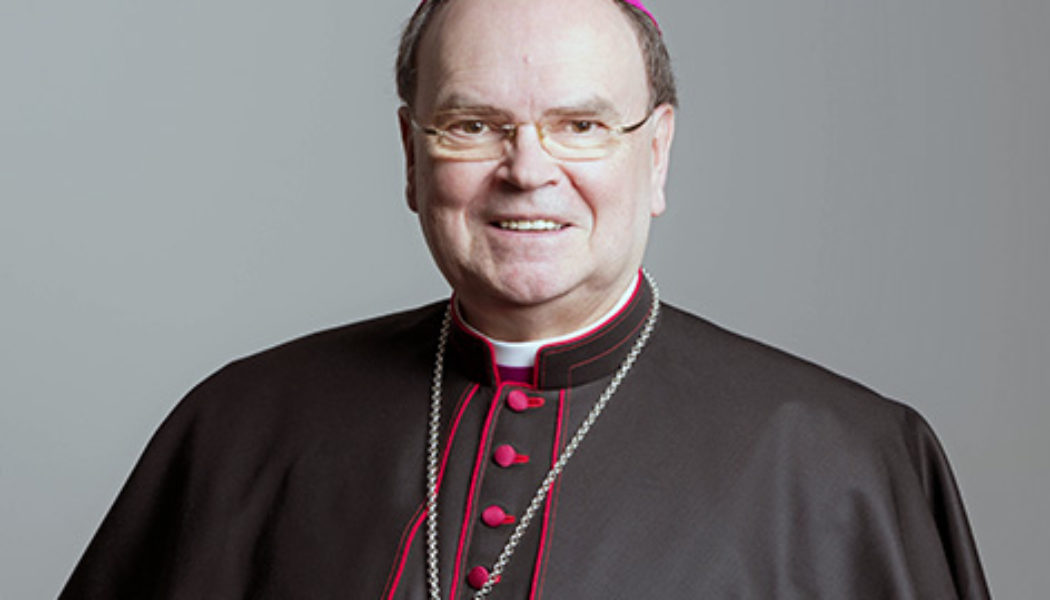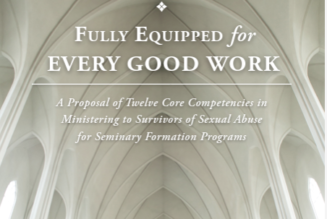
In any account of episcopal resistance to Germany’s Synodal Way and its most controversial aims, the name “Bishop Bertram Meier” figures prominently.
After all, the bishop of Augsburg was one of only a handful of German bishops to publicly vote against proposals to attempt to bless same-sex sexual relations and to sacramentally ordain women at this past March’s Synodal Way assembly and has previously said the process poises a “virulent” threat to ecclesial unity. Furthermore, he was one of five German bishops to send a letter to the Vatican in December 2022 raising concerns about the Synodal Way’s plan to establish a permanent “Synodal Council” to govern the Church in Germany, prompting a response from Rome that has, at least, delayed synodalists, who have instead established a transitional “Synodal Committee.”
But precisely because of this track record of public resistance to the Synodal Way and its excesses, Bishop Meier’s recent criticism of skeptics of the synodal process during his homily this past Sunday, in which he said that they suffer from a “circle the wagons” mentality, has been difficult to square for those who had assumed that the bishop’s previous opposition to aspects of the Synodal Way meant that he shared their same fundamental critiques of the process, its purported justification, and its intended ends.
However, according to German sources familiar with the Augsburg bishop, including a priest from his own diocese, that’s not the best way to understand the Augsburg bishop and his overarching modus operandi.
Rather than a confusing defection from a firmly anti-Synodal Way position, Bishop Meier’s criticism of Synodal Way skeptics can instead be interpreted as consistent with the same factor that animated his previous criticisms of the German synodal process itself: the tendency to position himself as a moderate “unity figure” who can play the diplomatic role of middleman not only between various factions within the German episcopacy but between the German bishops and the Holy See.
And at a time when both Curial officials and leadership of the German Bishops’ Conference, who held a surprise meeting on the Synodal Way this past July, are maintaining relative radio silence, Bishop Meier’s words and actions — including his criticism of Synodal Way skeptics for abandoning the process — may be the best “bellwether” available for surmising where discussions between Rome and Germany currently stand and particularly the Vatican’s current stance regarding the controversial process.
Both-Sides Bertram
According to German sources, the tendency to seek some degree of unity amidst deep differences is a fundamental trait of the 63-year-old Bishop Meier, who is the son of a Protestant father and a Catholic mother. Experiences later in life, like training at the Pontifical Diplomatic Academy before working at the Secretariat of State as head of the German-language department for eight years and serving as the chairman of the ecumenical Association of Christian Churches in Augsburg for nearly a decade, likely indicated as well as intensified the Bavarian’s propensity for diplomatically staking out the middle ground.
As a bishop, ordained only in 2020, this “both sidesism” has characterized more than just Bishop Meier’s engagement with the Synodal Way. For instance, he was the first German bishop to ordain priests and deacons for the traditionalist Priestly Fraternity of St. Peter, but, according to a diocesan source, he has also earned a reputation for being willing to assign more progressive priests to prominent roles in Augsburg.
This is not to say that Bishop Meier is without solid theological convictions. German Catholic media sources familiar with the bishop expressed their confidence in his orthodoxy on the hot-button doctrinal issues of the day regarding sexuality, ecclesiology and Church sacraments, as well as his personal piety and devoutness.
The Bavarian bishop is also not afraid to associate with initiatives of more outspoken critics of the Synodal Way, such as the recent Adoratio conference in the Diocese of Passau, or to express unpopular pastoral guidance, as he did on a recent EWTN Germany appearance, when he insisted that the sacrament of confession is sometimes needed before receiving the Eucharist.
But these theological convictions sometimes run into, as one Augsburg priest put it, Bishop Meier’s tendency to “appeal to all factions in the Church.”
Bishop Meier’s diplomatic inclinations, and his habit of staking out the middle ground, are perhaps especially heightened in the current context of the Synodal Way, given the Vatican’s involvement. Owing in part to his time in Rome and relationships that he still maintains there, Bishop Meier may be distinctly situated to step into the role of middleman — something he has done with gusto. In fact, shortly after his 2020 ordination, Bishop Meier reportedly said that he saw one of his tasks as mediating between the Church in Germany and the Vatican.
Bishop Meier’s intent to position himself as a “middleman” both within the German episcopacy but also between Rome and Germany helps make sense of his actions related to the Synodal Way. For instance, when Synodal Way leadership has been at its most antagonistic toward Rome, Bishop Meier has been clear to offer public statements backing the Vatican and calling for greater collaboration from the Germans.
But when the decision to fund the Synodal Committee was put to him this past June, Bishop Meier did not join the four other bishops with whom he had co-written the December letter to the Vatican on blocking funding, despite expressing misgivings about a lack of clarity of goals and authority of the body. By not doing so, he has maintained his involvement in the synodal process and his position as a key intermediary between Rome and the German episcopacy.
Bishop Meier’s more diplomatic tack also helps explain why he — and not Cardinal Rainer Woelki or Bishop Rudolf Voderholzer — was one of the three delegates chosen by the German Bishops’ Conference (DBK) to participate in the upcoming Synod on Synodality, which will meet in Rome this October.
Criticism of Synodal Way Skeptics
Similarly, Bishop Meier’s tendency to stake out the middle ground was probably behind his recent critical remarks of synodal skeptics. The Augsburg bishop said that those who criticize the German synodal process suffer from Wagenburgmentalität — the equivalent of a “circle the wagons” mentality, animated by “insecurity” that prompts them to give up on conversation and consensus-building and to wall off their opponents.
Bishop Meier said that these reactions, which are expressed with a kind of logical certainty and “little respect,” are a “flight from reality into a mentality with closed gates, with verbal and media weaponry that no longer radiates anything inviting” but rather focuses on contrasts between Catholics.
“Such a contrast no longer has anything to do with the Gospel,” he said. “Here the border to ideology, to rigid, lifeless tenets, has already been crossed.”
The bishop may have criticized others for circling the wagons, but his remarks also have the apparent effect of criticizing several of his fellow German Catholics. His comments seem to implicate lay leaders who have resigned from the Synodal Way over concerns that the process was “casting doubt on central Catholic doctrines and beliefs” and used pressure tactics to achieve desired outcomes, and also groups like Neuer Anfang, Maria 1.0, and many other German Catholics who have implored their bishops to stop legitimizing the Synodal Way through their participation.
But most significantly, the Bavarian bishop’s criticism of Wagenburgmentalität among Synodal Way critics will likely be applied to the four bishops who voted to block joint funding of the Synodal Committee: Cardinal Woelki of Cologne and Bishops Voderholzer of Regensburg, Stefan Oster of Passau and Gregor Maria Hanke of Eichstätt. Perhaps Bishop Meier did not intend to criticize these bishops with his remarks; or perhaps he was making a rhetorical move to further establish his bona fides as the most “reasonable” and moderate of German bishops.
A Roman Bellwether?
If this lens of analysis holds true, it suggests not only that Bishop Meier is motivated to be in the middle of Synodal Way disputes between Germany and Rome, but that his related words and actions may give some indication of what the Vatican has said about the process behind closed doors.
In this light, it is significant that Bishop Meier’s recent criticisms of Synodal Way naysayers come in the immediate aftermath of the surprise meeting between Vatican officials and representatives of the DBK — Bishop Meier among them — that took place in Rome on July 26.
In stark contrast to a November 2022 meeting between the German episcopacy and Curial leadership, both the Vatican and the DBK have been relatively tight-lipped about what was discussed and where things stand between the two parties regarding the Synodal Way. Whereas after the November meeting the Vatican newspaper published two Curial cardinals’ critiques of the Synodal Way, and DBK president Bishop Georg Bätzing held a press conference to make clear his intention to push the initiative forward, the only thing published after July’s meeting was a joint communiqué described as the continuation of a dialogue over “theological and disciplinary issues” held in a “positive and constructive climate.” One report suggested that the two parties are expected to meet again following the Synod on Synodality’s October assembly.
If he truly is a Roman bellwether, Bishop Meier’s criticism of Synodal Way skeptics seems to rule out any interpretation that the Vatican has turned up the pressure on the German episcopacy to gracefully pull out of the Synodal Way — which was a plausibility, given that the pressure on the German bishops from lay activists has likely lightened with the completion of the assembly phase and that episcopal unity in Germany is already fraying. But if Rome had given instructions to the German bishops to begin disengaging from the synodal process, Bishop Meier would likely be amplifying that message — not openly promoting the opposite line in a Sunday homily.
Of course, Rome may have its reasons for wanting to keep the German bishops in conversation beyond the course of October’s Synod on Synodality assembly. And perhaps Bishop Meier’s critical comments were part of yet another carefully crafted diplomatic move, ensuring that the more orthodox prelate continues to have a seat at the table of any discussions between Rome and Germany about the Synodal Way.
But some German Catholics worry that, once at the table, instead of firmly standing for fidelity to Church teaching and discipline in the face of the synodal process’s ongoing assaults, the Augsburg bishop will continue to seek surface-level unity and “staying in the middle” above all else.







